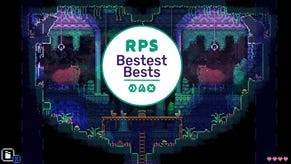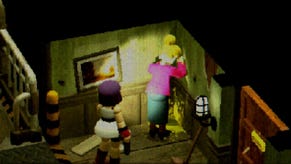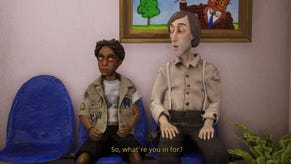Wot I Think - Winter Voices: Avalanche
The prologue to episodic indie RPG Winter Voices, Avalanche, was released over the weekend, available for the pocket-sized price of €4.49. Even for an indie game Winter Voices has a standout concept- you’re a girl simply trying to overcome the death of her father. Read on for Wot I Think.
Winter Voices is upsetting. Heartbreaking, even. And writing this review is the hardest part of all. Because my word, is this ever a wonderful idea for a game. And boy, does it ever disappoint.
But I'll get to that. Just let me be positive for a minute, because this is a brave little game that deserves some love.
Easily the most impressive aspect of Winter Voices is how it manages to gracefully transport the framework of a tactical RPG - classes, experience points, skills, quests and battles - into a stark and comparatively realistic setting. As I mentioned above, the game is about getting over the death of your father. Winter Voices: Avalanche opens with you paying your last respects to his body, quickly moves on to his rustic cremation, and from then on you’re free to wander and talk to the simple folk of the sad, snowbound community in which you live, and engage in pitched battles.
The battles are - wait for it - entirely metaphorical. If you approach a building that featured prominently in your childhood, or for whatever narrative reason your character is overcome by despair, a fight starts as you’re assaulted by spirits and memories which chase your character around the map in a fairly straight tactical style.
Now, this is where Winter Voices starts getting clever. At least in the Prologue, there’s no way to actually defeat these feelings. The objectives of different fights might simply be to run away, or survive for a certain number of terms, or stop the feelings from getting past a certain point. You do this through use of skills unlocked from a beautiful skill tree which is absolutely my favourite part of the game.
Have a look:

It’s a snowflake. An enormous, emo snowflake. You start at the centre, and each direction represents a different way of dealing with grief. See the yellow-looking skills towards the bottom right? They relate to regressing into your own imagination. The orange skills above those are all to do with being sociable, and the power of friends. An example of a skill that lies between both of those areas is Imaginary Friend, which summons an ally that will hold enemies back.
I chose to go in a different direction, however. I decided my girl was more intelligent and self-aware than she was smart, so the skills I chose could all be found on the upper half of the snowflake- skills relating to strength, anger, denial and building walls around yourself. Two early skills I took were Emptiness, which drastically reduces healing and damage, and Betrayal, which has you “deny your own personality in favour of a better one. Prevents enemies further than 4 tiles away from attacking you.” These choices let me then grab Super Ego, which boosted my Confidence skill and my ability to push enemies back.
Another clever aspect of the combat is your character’s Memory statistic. When you’re allocating stat points after you’ve levelled up, you can increase your memory to boost the rate at which you gain experience (because you learn more from each talk and encounter), but it also causes the demons you wrestle with to grow in strength (your sad memories gain clarity).
All it amounts to is a completely seamless dynamic difficulty slider. Want more skills and more complex battles? Crank up your memory. Or is your character breaking down as she runs out of energy during every single fight? If so, you leave your memory well alone. You try and forget.
Winter Voices’ core concept of melding grief and RPG mechanics impressed me so much that I quickly began using my own bank of evasive mental skills to help the game out. I started ignoring or forgiving absolutely everything Avalanche was doing wrong, positive that the game was just finding its feet. Judging by the other reviews out there, I got much further than most, but it couldn’t last. There are some astonishingly bad design decisions in Avalanche that I just cannot believe developers Beyondthepillars either didn’t notice or didn’t consider issues worth fixing.
While I love the idea behind the fights, the animations all take three times as long as they should, and you’re not given nearly enough information on how the rules of the game work. At best, fights in Avalanche still manage to be tense, close-run things. At worst, which is when you’ve just had a fight, thanks, and you know how to win, and it’s easy, the battles are the videogame equivalent of watching a fat man climb stairs on his hands and knees.
Wait, I take it back. The worst battles in Avalanche consist of the more abstract fights you have as a result of the village elder advising you to drink some magic mushroom tea and go to sleep. Always a good idea when dealing with unfathomable emotional damage, that’s what I say.
The first of these jaw-droppingly ill-conceived horrorfights has you defeating a collection of small, black spirits which are sustained by a number of white flames. The white flames shoot balls of energy along the two axis where they’re located, so to defeat the black spirits you have to use your repulsion power to knock the white flames or black spirits into places where they can’t help one another. It’s a puzzle.
However, there are a lot of black spirits, and there are also a lot of white flames, and both the spirits and the flames actually move to help one another as you’re slowly trudging around the map. You move your paltry maximum of 4 tiles, you watch another 25 seconds of energy-shooting animations, and maybe one of the flames or spirits makes a move which resets all the work you've been doing for the last minute. It took me a full 45 minutes of anguish before I’d extinguished the last spirit.
I think this was roughly when I started running low on goodwill, meaning I was in no shape for what Avalanche throws at you next- an approach to your home that takes the form of a long gauntlet, with spirits chipping away at your energy the whole way. Believe me when I say that the layout of this particular battle is ball-wrinklingly tedious enough already. But guess what? When you win, it’s revealed that the fight is in fact a puzzle, and if you simply complete it then you have to play through it again, and again, until you figure out what in blue fuck the game wants you to do.
When I completed the fight for the second time Avalanche actually crashed, losing me the experience points that had up to then been the sole redeeming feature of the last half an hour. I remember screaming, but after that the memory gets hazy. When I came to my senses an hour later I was lying naked on the floor of my kitchen, my feet were bloody from where I’d kicked in my monitor, and I’d daubed POT FUCK on my bare chest in low-fat yoghurt.
This is me hiding from dangerous memories in the Northernmost part of the map. I enjoyed this fight, actually.
When I first started playing Avalanche I saw myself recommending it in the same way I recommend Pathologic- as a bleak, cruel, yet utterly fascinating experience. But it’s not a fair comparison, because while Pathologic did its own thing right up to the end, Avalanche is half interesting, and half a mediocre tactical RPG that’s not worth anybody’s time.
This said, I’m maintaining some amount of optimism for Episode 1 of Winter Voices, which according to the game’s site should be out next week. I think that as fights start to feature more skills and companions, there might be less of a reliance on gimmicky battles, which the developers have proved themselves about as good at designing as an equal number of sea otters.
And if the fights in future episodes of Winter Voices pick up, then we’ll be free to enjoy everything else that’s on offer here, like great music, loveable art, and writing which, while often melodramatic and slow, never once bored me.
If you're interested in giving Avalanche a shot, you should go right ahead. It's not even €5, and if you ignore all the pain it caused me I probably got about €5's worth of fun out of it. If you're on the fence, I'd say it's worth waiting and seeing what Episode 1 brings. If its mistakes are a little less dramatic, you can be sure I'll be all over it.














